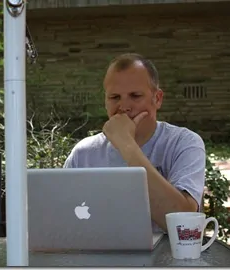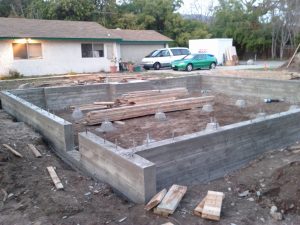Start a six month emergency fund? Are you crazy? How can I save that much money before I start investing? I’ll never make it! – most common reaction to my advice to create an emergency fund.
Personal finance is fun, but maybe the most boring part is creating an emergency fund. Yawn.
Building an emergency fund should be exciting. Sure, it’s the bland foundation of the house, but once this baby’s built, you’ll be able to rock ‘n roll on the fun stuff:
– Work without worry. You’ll know that even in an uncertain economy, you can focus on career instead of your next paycheck.
– Invest with confidence. We’re all worried about the market collapsing, but the best strategy is often to ride out downturns. With a reserve, you won’t have to decide whether to sell or not: you don’t need the money today.
– Weather financial storms. Is the muffler dragging behind your car? It’s covered! Did your dishwasher break down? You can fix it. Sure, you’ll have to slow your investing plan for a bit to rebuild the reserve, but you won’t be sweating the small personal finance stuff in life anymore.
In short, the reserve is the lynchpin of your personal finance plan. Doesn’t that fire you up?
Whether you’re excited or not, saving toward a reserve is a painful part of personal finance. That’s why gurus such as Dave Ramsey set the bar lower, like $1,000. Once you can weather the small storms, then you can focus on bigger fish.
At some point, you’ll need to adequately fund the reserve. There’s good news here. A six month cash reserve isn’t as large as you think it is.
First, people focus on three to six months of income, not expenses, when it should be the other way around. You don’t need six months worth of income. Your gross income from a job includes:
– federal taxes
– FICA taxes
– state taxes (in many places)
– savings
– insurance deductions (you’ll need to keep insurances in place, but the cost of workplace life or disability insurance will be removed). Unfortunately, you may have to self-purchase health insurance.
In a pinch, you don’t need to cover many of these costs. Instead, you’ll need only the basics: groceries, gasoline, clothing costs, utilities, and mortgage or rent payments. Add in any other debt payments you’ll have, and that’s your emergency fund amount.
This is a much, much smaller number than you may have realized.
Everyone wants to get their personal finance plan moving in the right direction. Building the foundation of your plan isn’t nearly as fun as what comes after. By focusing on the right number, you’ll have it built more quickly than you first imagined and be on your way to more entertaining goals.
(photo credit: martinak15, Flickr: frustrated; R Berteig, Flickr: foundation)

Joe is a former financial advisor and media representative for American Express and Ameriprise. He was the “Money Man” at Detroit television WXYZ-TV, appearing twice weekly. He’s also appeared in Bride, Best Life, and Child magazines, the Los Angeles Times, Chicago Sun-Times, Detroit News and Baltimore Sun newspapers and numerous other media outlets. Joe holds B.A Degrees from The Citadel and Michigan State University.

Having our emergency fund in place really helped turn things around for us! It’s so nice to know that “life” can happen and you’re still covered. $1000 is a little too small for my liking though. I’m more of a $3-5k kind of guy.
I think having an end goal with that emergency fund makes it easier to save for. For our e-fund, we started saving because we wanted a down payment for our condo. That fund was actually also an e-fund. Once we started saving, we were addicted and we kept wanting to save for the down payment. Soon enough we had much more than 20% and that part is our e-fund.. Make it fun!
AvgJo, I didn’t see a post yesterday, so I hope all is well.
We keep over a year of expenses in our kitty. And we continue to grow it each year, but invest in more sexier options such as long term CD’s (which isn’t a bad place for the entire emergency fund) and I-bonds. Ok, that’s about as sexy as stripper with a cast on her leg, but it still gets the job done.
We’re getting back to normal, Bichon. Thank you for noticing. It hasn’t been fun here.
Sexy isn’t necessary for the emergency reserve. Better to let the stripper take it all off in the investment portfolio. I’m not sure what I just said, but somewhere in there was an analogy.
This is true. I think a lot of people think of an “emergency fund” in terms of how they’re spending today. The problem with this thinking is that if you actually are faced with a true emergency, there’s no way you’re going to spend the same as you do now! You’re going to eat ramen noodles 3x/day if you have to, walk 2 miles to work, cancel your cable entirely. Yes, much smaller already.
A common theme I’ve been hearing lately is to rename it the f-u account or the screw you account. That way when life happens, you can tell the man, “Screw you!” That’s totally helping me out. I’ve learned the hard way that if you don’t have this foundation, your house will come tumbling down.
Emergency funds ARE really boring to build up. I feel like I’m wasting my time and money doing so whenI shoudl be investing and paying down debt. But I keep getting told that it’s essential, so I’m keeping at it.
We’ve been saving up every month, I agree it’s a little boring but not when you have a specific goal. Just leave it on auto debit and forget about it 😀
Automatic payment is definitely the key to success, Aaron. Well, that and a healthy supply of doughnuts.
I think you’re right to focus on the 6 month (or however many) of expenses rather than income, but I think the real thing is determining how willing and able you actually are to cut expenses to the very bone if need be on little notice. You should decided ahead of time, are you canceling the cable TV? What about the internet? Coffee? Then you can determine how much of a fund you actually need to stash away. Personally, we have about a years worth of easy to access cash and equivalents. Like Bichon above, we also have some longer-term CDs for a majority of it.
Great advice, Karl. Most people never even plan, so I’m happy if they actually just think about ANYTHING financially related! If they hit details I’m throwing a party.
The trick for me is auto save. I never really see the money and it magically appears in my savings. I like to keep around a years worth in reserve, but I don’t keep my reserve and regular savings separate so I guess that’s cheating.
I won’t tell anyone you’re cheating Paul. That’s a nice reserve. Makes it easier to take risks with investments…good move!
One of the first things I did when first starting out was to build the emergency fund. I read a Suze Orman article when I was in college, and for whatever reason, that piece of advice stuck with me. I’m glad I did create one early on, though, as you said, it isn’t the most exciting thing to do. I will admit that it does bring a great peace of mind with it. Just set aside a little bit each month, and make automatic payments as some have suggested. It will get done in no time, and then you won’t have to worry about it anymore!
I think the key to your comments, FI is “in no time.” We worry about it taking months…but then the months fly by and you’re there. Awesome.
I have already stated my views on emergency funds. I will not be saving funds for a separate fund. I personally think that the money could be better spent.
Mind you, this is for my situation, and everyone’s situation is different.
…so I just got done scouring your blog for the post on emergency funds. It was March 13th for anyone else who cares, and it can be found here: http://mycanadianfinances.com/page/9/.
I’m sorry I missed that post. Let me see if I get what you’re saying: because you have a good income that could go bye bye at any moment AND you’ve had penny stock investments that have experienced a crash of 25 percent AND you’re familiar with the fact that you would have to go into debt or take from these investments (possibly when they’re tanking) in the case of an emergency that having a cash reserve is a bad idea?
What could go possibly go wrong with that strategy?